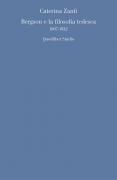Bergson e la filosofia tedesca 1907-1932

This essay tells a largely forgotten story: that of Bergson's relationship with the German philosophy of his time. From The Creative Evolution (1907) to The Two Sources of Morality and Religion (1932) Bergson radically redefines his philosophy, enriching it with new anthropological themes in which the echoes of the German debate on the philosophy of life are recognizable. Through the analysis of the "German" polemics which in those years concerned or involved Bergson, is studied here not only the reception of the Bergsonian work in Germany but also the lasting impact of this intense dialogue, both on the philosophy of the French thinker (The two sources) and on that of authors such as Eucken, Simmel, Driesch, Windelband and Scheler. The four stages in which the book articulates this philosophical meeting (corresponding to the cities of Jena, Berlin, Heidelberg and Göttingen) give us a new profile of the Bergsonian thought, that is perfectly appropriate inside the contemporary debate about the pressing themes of technique, history and war.